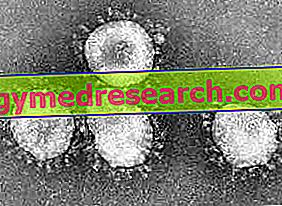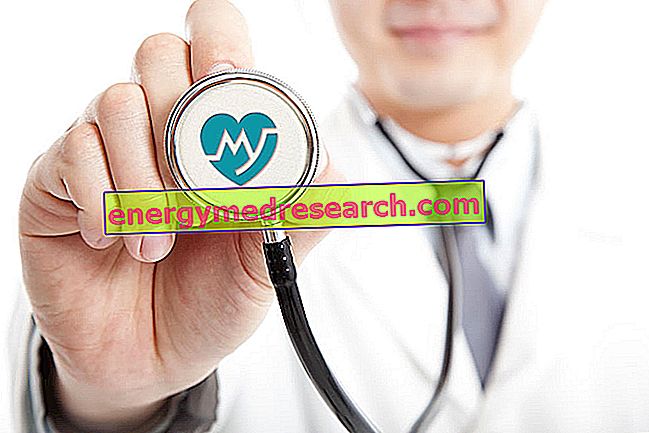Definition
The term "esophageal varices" refers to a pathology characterized by an abnormal dilation of the veins located in the lower part of the esophagus, a typical condition of patients suffering from severe liver diseases. When broken, esophageal varices can create potentially lethal bleeding and bleeding.
Causes
Esophageal varices are a common consequence of portal hypertension, in turn secondary to liver cirrhosis and alcoholic hepatitis. Among the other causes associated with the formation of esophageal varices, we mention: parasitic infestations (eg schistosomiasis), hepatic scarring and thrombosis responsible for obstruction of the portal vein.
Symptoms
In addition to the difficulty of swallowing, the esophageal varices do not begin with any particular symptom, except for the bloody ones; in the latter case, the bleeding can cause hematemesis (the patient vomits blood), tarry and black stools and, in the most serious cases, shock. Clearly, when esophageal varices result from liver disease (cirrhosis), the patient will also complain about all the symptoms of the underlying pathology.
Information on the Esophageal Varices - Drugs for the Treatment of Esophageal Varices is not intended to replace the direct relationship between health professional and patient. Always consult your doctor and / or specialist before taking Esophageal Varices - Drugs for the Treatment of Esophageal Varices.
drugs
The bleeding esophageal varices require immediate medical help: it is estimated, in fact, that one patient every 5 affected by bleeding episodes cannot overcome the disease. There are drugs and medical procedures that can stop the bleeding caused by esophageal varices: we are talking about very important treatments not only for the treatment of the problem but also for the prevention of complications.
The choice of drugs and medical procedures clearly depends on the severity of the esophageal varices and the risk of bleeding: these aspects are evaluated thanks to a diagnostic examination called esophagus-gastro-duodenoscopy.
In some cases, the patient is subjected to alternative treatments, useful for avoiding any exogenous fever bleeding:
- ligation of esophageal varices
- sclerotherapy (injection of a vasoconstrictor drug into the bleeding vein, useful for promoting the formation of clots in varicose veins)
In some patients, the bleeding caused by ruptured esophageal varices is such that it requires a blood transfusion; in extreme cases, especially for esophageal varices related to severe cirrhosis, it is necessary to act by reducing the pressure inside the veins; this is possible by creating an artificial venous bridge that diverts blood from the portal vein to the vena cava or to the renal vein (a decompression of the portal vein is obtained)
.
Non-selective beta blockers : they constitute the first line therapy in the prevention of bleeding from esophageal varices. These drugs exert their therapeutic activity by reducing both cardiac output and portal pressure, creating a splanchnic vasoconstriction.
- Propanolol (eg. Inderal) widely used in therapy for the treatment of hypertension, angina pectoris and thyrotoxicosis, propanolol is also used as a first choice drug to prevent bleeding from esophageal varices.
- Nadolol (eg Corgard): particularly effective in preventing recurrent bleeding. The dosage, which must always be established precisely by the doctor on the basis of the severity of the condition, must be such as to reduce the heart rate by 25% (not less than 55 pulps). Indicatively, the drug should be taken once a day at an initial dose of 20 mg. The dose can be increased, always under medical supervision, up to a maximum of 240 mg.
Nitrates : their therapeutic use for the treatment of esophageal varices is indicated above all in the prevention of haemorrhagic recurrences, especially when used in combination with beta-blocker drugs.
- Isosorbide 5 mononitrate (eg Duronitrin, Monoket, Monocinque Retard, Isosorbide MYL): The drug is used in therapy for portal pressure reduction. The dosage must be carefully determined by the doctor.
Hormones (vasopressin analogues): they are drugs used both in the prevention and treatment of bloody esophageal varices: vasopressin and its analogues are able to exert a reduction in the blood flow that enters the portal vein, consequently the portal pressure decreases and the variceal bleeding is denied.
- Terlipressin (eg Glipressin): the drug is available as a powder or solvent for intravenous injectable solutions (1 mg of active ingredient). The administration of this drug for the treatment of esophageal varices must be performed in a hospital setting by an expert in the field.
Sclerosing agents:
- Ethanolamine oleate (eg Ethamolin): start the treatment with a dose of active variable between 1.5 and 5 ml for varicose vein, to be administered intravenously (do not exceed 20 ml per treatment session for esophageal varices).



